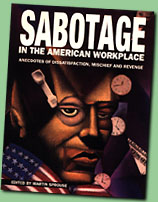
Title: Sabotage in the American Workplace:
Anecdotes of Dissatisfaction, Mischief and Revenge
Editor: Martin Sprouse
Year: 1992
Publisher: Pressure Drop/AK Press
Price: $12.00 US
Review by: Yvonne Jones



Title: Sabotage in the American Workplace:
|

 |
"What are you reading?" It's a casual question, and since I'm always schlepping around some book or magazine for reading on the sly, one I get asked rather frequently. But for the week or so following the purchase of my copy of "Sabotage In the American Workplace" back in 1992, that became a question I dreaded. As soon as someone saw the cover and title, they were off detailing their own anecdotes of workplace anger, bad or just plain evil bosses and co-workers, and their own well thought out tactics of revenge. Reading the book in public became such an interactive experience that the only way to finish reading it was in the privacy of my own home."Sabotage" documents reactions from workers experiencing the day-to-day frustrations and conflicts of trying to earn a living. Does this sound like EVERYONE you know? Editor Sprouse, who says the book was inspired by the two years he spent in the mail room of a "typical American office," defines sabotage loosely -- as anything that you do at work that you're not supposed to do. That definition is probably accurate, if rather broad. Embezzling company funds is obviously sabotage; so is using the company phone to arrange after work get-togethers with your best buddy or your love muffin.
Birds do it, bees do it, trash collectors and PhDs do it...The interviewees in "Sabotage" prove that every industry is a service industry and workers in every job category -- transportation, communication, hotels, sex, real estate and my personal favorite, retail -- have axes to grind. Revenge, whether for harassment, low pay, or poor working conditions, is a popular motive: A plant nursery worker falsely accused of -- and fired for -- stealing spread a generous helping of weed killer all over the plants as he departs. Construction workers who haven't been paid in weeks by a visibly wealthy owner demolish the structure they've been working on for months.
Boredom rears its ugly head too. A Toys R Us employee switches the clothes of GI Joe and Barbie dolls and causes a media sensation. A stock broker randomly hits some keys in the trading department then runs to a screen to watch the market fluctuate. A sympathetic loan officer "loses" paperwork to give loanees more time to pay their balances. Reasons (some might call them excuses) vary. But while some of the saboteurs express sorrow at their actions, many are only sorry that their workplaces drove them to such behavior. A few unrepentants merely regret getting caught. Whether you're planning your next round of workplace mischief or wishing you had the nerve, "Sabotage" is a highly entertaining read.
(NOTE: Keep in mind that in these days of postal worker shooting sprees and domestic terrorism in the U.S., some folks are frighteningly literal. The word 'sabotage' has very strong connotations for these people and they will look at the book's cover -- and its spooky illustrations by Tracy Cox -- and deduce that you are the next World Trade Center bomber. I recommend a book jacket if reading this volume in public.)
All typos and mistakes in this book are due to employee sabotage.
(p. 1)After I graduated from journalism school I got a job with the Burlington County Herald, a daily paper in south Jersey. I was making a whopping $150 a week and wasn't a happy camper... My job was to call up every police department in the south Jersey area and write a recap of the evening's events for the morning paper...The editor was hassling me for my extended lead paragraphs for these minimal stories. He threatened to fire me so I said, "Fine. You want short paragraphs, you got 'em."
The next day two articles appeared in the paper. One headline read "Dead." This was followed by "Dateline: Medford, New Jersey. That's what Harry Serbronski was after his car hit a telephone pole at eighty-six miles an hour." The other headline was "300 pounds burnt." At the time, the police were raiding a lot of pot growers and everybody assumed, after reading the headline, that another pot grower had been caught. But the next line was "Dateline: Marlton, New Jersey. Flash fire went through a farm building killing one obese woman weighing 304 pounds."
The family of the woman sued the paper on grounds of malice. The paper was taken to court over the story and lost. I got fired the next day. I had no regrets.
--Lee, reporter
(p. 51)
How can a book like "Sabotage" not have universal appeal? Even that baffling and enviable minority who absolutely love their jobs must have their dark days. Sprouse pretty much lets his saboteurs speak for themselves, so those expecting an objective, balanced commentary -- such as one proclaiming that workplace sabotage is, in the final analysis, really, really wrong -- are on their own with this book. It is probably best to leave your delicate temperament and consumer outrage at home while picking up your copy. But, although some of the interviewee accounts are quite detailed (and imaginative!), those malcontents seeking a how-to book would be better served by a copy of "The Anarchist's Cookbook." Despite its documentation of unhappiness in the work place, this book is frequently hilarious. As the success of the Scott Adams cartoon "Dilbert" demonstrates, workplace misery loves company. And there is plenty of company to be found in the pages of "Sabotage in the American Workplace."On a related note, be sure to check out the Tripod columns about on-the-job revenge by Bruce Tulgan and Harry Goldstein.
N.B. "Sabotage in the American Workplace" is available on the Web by special order from amazon.com. You can also order it directly from the publisher for $12 postpaid: Write Pressure Drop Press, P. O. Box 460754, San Francisco, CA 94146; or call (415) 821-4592.
Have you read this book? How many wrenches would you give it? (The more wrenches, the better a "tool for thought" it is.)
Tripod members give this book 3.5 wrenches so far.
You can also read and rate more of Tripod's Tools for Thought.
Map | Search | Help | Send Us Comments